#and it defines louis's life
Text
can I be honest I think it's kind of crazy how much lestans go on and on about lestat's trauma because I honestly think louis, claudia AND armand all had it worse. sorry.
#not saying lestat didn't have it bad BUT COMPARATIVELY???#u can say not to compare traumas but especially considering they aren't even real anyway i don't rlly give a fuck#like if we're being honest. I think all of them had it worse than lestat#lestat INFLICTS worse on louis he abused that man physically emotionally and sexually for over 30 years#and it defines louis's life#not just because of the trauma but because lestat MADE him#like even if lestat wasn't fucking abusive he would have had that grip on louis that's impossible to shed#AND DON'T EVEN GET ME STARTED ON CLAUDIA.#GOD TAKE ALL OF CLAUDIA'S SUFFERING AND GIVE IT TO LESTAT#lowkey even armand's reasoning for being such a fucked up little weirdo are more understandable than lestat's to me#NOT SAYING IT'S JUSTIFIED AND CRIMES AGAINST CLAUDIA CAN NEVER BE FORGIVEN#but it's more UNDERSTANDABLE to me after the shit armand was put through#as if lestat didn't try to kill claudia anyway...#tbh. loustaters less intellectual than myself will try to claim loumand break up because of what armand does to claudia#but is that really true?#after all louis stays with armand knowing...#unless he doesn't know in the show version. we'll see. but I suspect he does#and lestat tried to kill claudia so honestly what is the fucking difference#I mean ok. sure. fine. it's KIND OF different#but it's not as though lestat wouldn't have gone through with it if he could have#again less intellectual loustaters will disagree will say there was some kind of misunderstanding BUT I BELIEVE THAT MAN IS NASTY ENOUGH
3 notes
·
View notes
Text
sorry but do you ever think about the fact that the bernard we have today is a direct amalgamation of everything that happened in his past and i know that sound like such an obvious statement to say but it actually kills me to know that you can draw a direct line from who he is today all the way back to that sixteen year old boy who watched his best friend bleed out. like it is the defining moment in his life. it fundamentally shaped who he is and the person he's become. he is the bernard we know and love not despite the grieves shooting but because of it. because the gangs all got together and shot up his school. because tim walked out of that room with nothing but a baseball bat. because his darla got shot. because he watched her gasp and cry as she died. because he watched the blood coagulate around the wound. because he sat there and held her hand as her life drained out of her. because he walked into school that day with a joke he knew would make her laugh and her nose would scrunch up and she'd snort a little and tim would roll his eyes at him and call him ridiculous and instead he walked out with a bloody white shirt, blood under his fingernails, and two friends less. because, even now, almost half a decade out from the shooting, he thinks that if he closes his eyes, he will always be that stupid, scared little sixteen year old, holding the cooling body of dead best friend.
#there is a direct throughline from the boy we meet in robin 121 all the way to man tim reconnects with in urban legends 4#like maybe you guys have other interpretations of it but to me this is *the* defining moment in his life#and that's not to say that he perpetually bound to this traumatic event but it impacted him sooo much that his life is now divided#before shooting and after shooting#like you cannot tell me him falling into the cult was just something that happened to him#it happened bc he was in such a bad place from watching his friend die and then on top of that he loses contact with tim!!!!#this is his canon event!!!!#if you took it away from him if you made it so that he never had to go through it#the bernard we would get would not be the same bernard we got in urb leg4 and tdr#does it not make you want to chew on drywall that to get to the bear we love he has watch his darla die first????#head in hands head in hands#and it wasnt like batman came immediately after darls died!!! iirc they had to wait a little before he came#which means!!!!! alll those kids but bear esp had to sit in that room with darls' dead body until batman came!!!!!#do you think he cried and held her hand until batman came??? do you think he begged her not to go??? or do you think he told her#stories and made promises of all the things they were gonna do after they got out??? do you think he put pressure on the wound and#watched as the blood soaked through the jacket they were using as a towel??? and when she finally passed do you think he bit his lip#clean through to stop himself from wailing? bc if he's too loud the gunmen will hear them and he cannot be the reason jay from#history dies#auuuugh i cant fucking do this anymore#bernard dowd#timbern#darla aquista#louis grieve trio
118 notes
·
View notes
Text
Iwtv s2 ep2 spoilers
My thing I'm wondering is that in the promos/trailers claudia screams that Louis "picked another one over me" but in this episode she's encouraging louis to live outside of her and pursue a romance with Armand. I wonder what's going to change in the next few episodes.
#mini meta in the tags#its an interesting dynamic theyve written#because i cant yet really blame claudia or louis for feeling the way they feel#louis can call claudia his sister all he wants but she'll forever be his baby girl. their relationship cannot change. but what happens when#the daughter feels defined by said relationship?#does having a child mean one cannot ever love again? if not what does claudia mean by choosing another?#do we as children owe our parents anything? and when we become adults do our parents owe us anything? things to ponder#how can i say claudia deserves to live her own life but say louis doesnt#iwtv#interview with the vampire#louis de pointe du lac#claudia iwtv#iwtv spoilers#iwtv s2
33 notes
·
View notes
Text
yk I would love to make a horror themed webseries online with inspirations from many things I enjoy, talk about, and obviously show it but the fear of Matpat going theorise on it and be like ‘There are many references to the artist Louis Wain in this one scene with x character, Louis Wain was a famous schizophrenic artist, There for x character had schizophrenia’ despite me wanting to do a cool ass scene inspired by the kaleidoscope cats of Louis Wain
#this is reffering the fact that gt is doin’ a genloss theory#and also referencin’ his wilbur Arg video where he said that he had DID and it formed as an adult#despite it being so easy to know that it only forms under the age of 10 with a google search so quick even#I (someone who doesnt have DID nor Osdd) knows that#Also nobody knows if Louis Wain had sciztophenia and he most likely didnt#While he did have some form of mental illness#and even if he did that shouldn’t define his whole career and life#sorry rant over
2 notes
·
View notes
Text
"Armand is Alice and Daniel's wife/s and kids aren't real" has become a popular fan theory (even Luke Brandon Field said he liked it!) but i'd be surprised if it was right. I think it's definitely possible that Devil's Minion will be adapted in the show (though probably not exactly like in the books), but i personally think this whole imaginary family thing would be a poor way to handle the storyline for a variety of reasons. I think a twist like that would probably come across convoluted and (as Daniel might say) like something from a telenovela.
We see children's toys in Daniel's house and he's public figure who many people know with an autobiography and everything. Creating decades worth of false memories for Daniel and somehow also maintaining that imaginary life story for decades wouldn't be enough, Armand or whoever did it would also realistically have to have an absurd level of control over the physical world, public records and many other people's minds to sustain an illusion like that. I also frankly think it would be difficult to avoid having some sexist and biphobic undertones to the idea that Daniel's relationships with women were unreal and meaningless and only his relationship with a man matters.
However, the most important reason why i think Daniel's wives and children should be real is that they make him a richer, more nuanced character and are actually central to understanding him and his motives. He has lived a full and complex life that has been influenced and to some extent defined by his encounters with vampires, but those vampires still weren't his whole life. I think it's more interesting to see Daniel's human life and his relationship with Armand and Louis as something connected and overlapping that both affect each other. We actually learn quite a lot about Daniel from what he says about his partners and children.
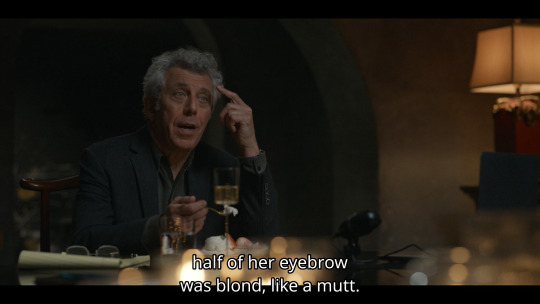
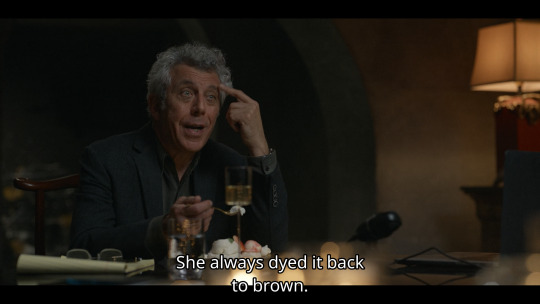
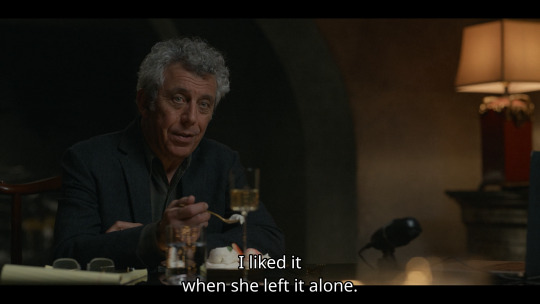
This scene - as well as how Alice in general is discussed - reminded many people of how Daniel in the books talks about Armand, such as this famous passage:

Parallels between Daniel's relationships with Alice and Armand in the books are obvious but i think they're just that, parallels. Both the sweet little scene where Daniel is talking about Alice's eyebrows and the book scene where he's talking about loving Armand not despite but because he's a monster reflect in different ways who Daniel is as a person; he feels drawn to unconventional and strange and sees beauty where others might not. He ended up in this situation with vampires too because he wanted to interview people who're rejected by the society.
If Daniel already had some sort of relationship with Armand in the past it makes sense that it would be associated with Alice in his mind. There may be an overlap between the timelines of those relationships. A memory of Armand rises when Daniel is reminded of Alice rejecting his marriage proposal, in the books Armand rejected his wish to be turn him into a vampire, which would've been something akin to marriage. I think Alice being real is much more compelling for Armand's character too, with Armand expressing surprising understanding and sympathy toward Daniel's wife rather than just speaking about his own experience through an imaginary woman.
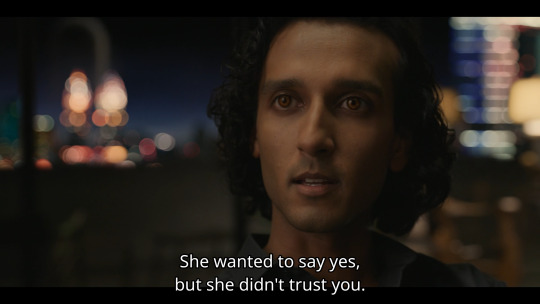
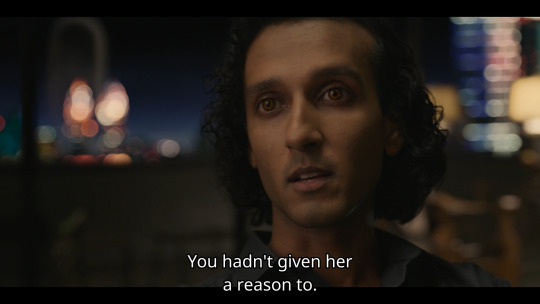
Completely putting aside Devil's Minion and is it a thing in the show or not, i think Daniel's family is particularly important to Louis' and Daniel's relationship. Something that hasn't technically been explicitly said but to me seems obvious is that Louis and Daniel strongly relate to each other as fathers. Many scenes where we see Louis and Daniel show vulnerability in front of each other have something to do with their partners and children. In 1.02 as one of the earliest examples of this Louis replicates the dessert Daniel had with Alice, trying to connect with him and his humanity through it, Daniel shares personal memory and they eat together in companionable silence.
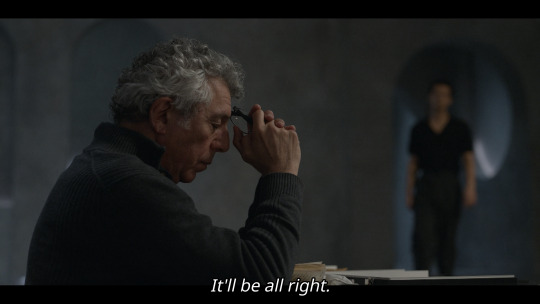
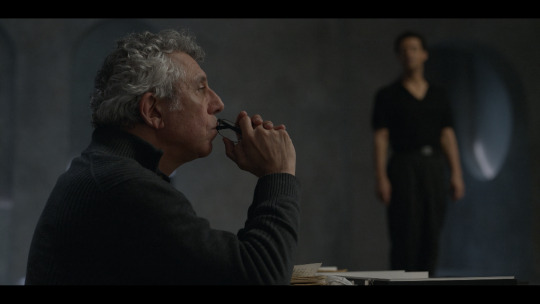
I would argue that Claudia, her memory, and Louis' relationship with her is the heart of the story in these first two seasons. Claudia entering the story in 1.04 marks the shift in the interview and Daniel's approach; he becomes both more combative and more emotionally invested. He has a strong reaction to reading Claudia's diaries, and it's not difficult for any parent to guess that he's also imagining her own daughters in similar circumstances to Claudia.
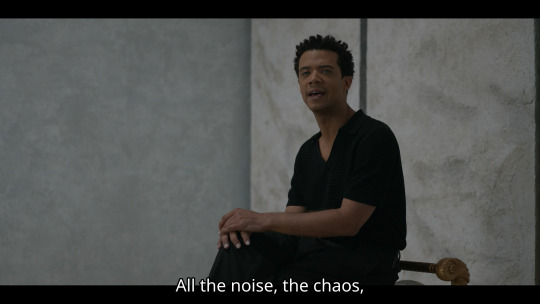
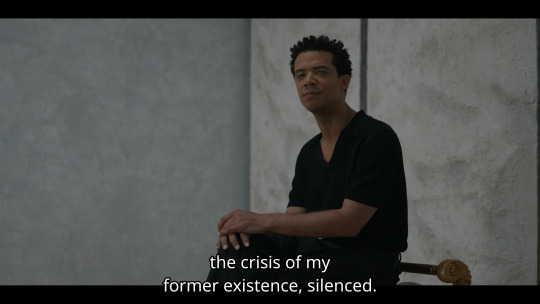
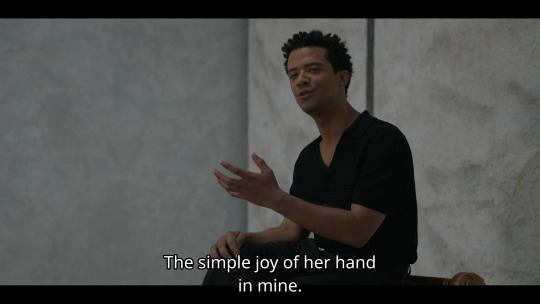
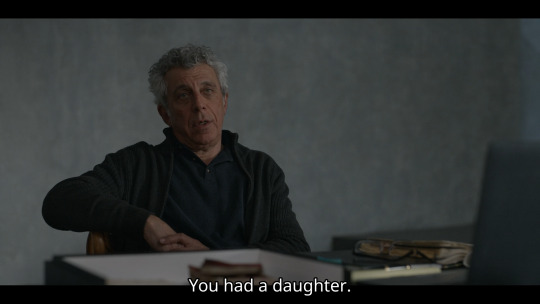
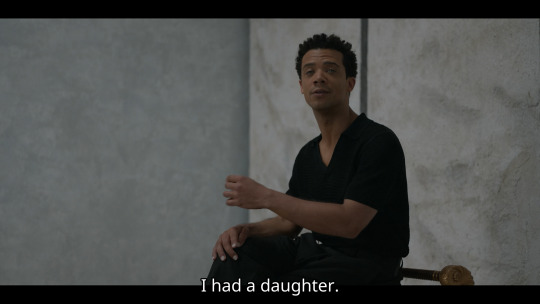
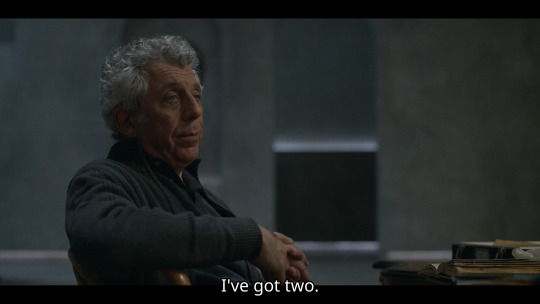
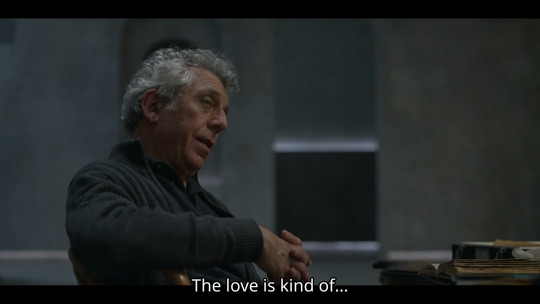
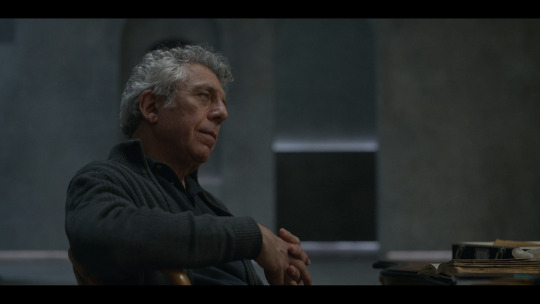
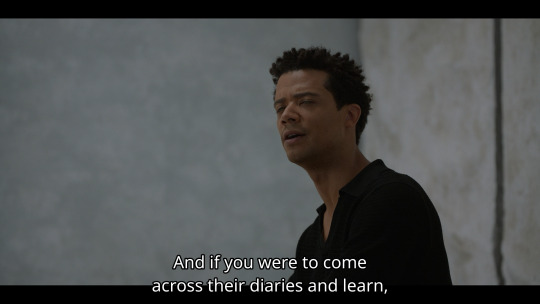

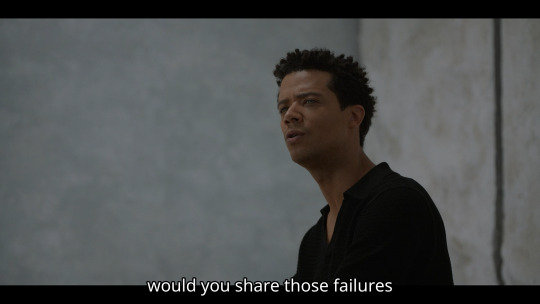
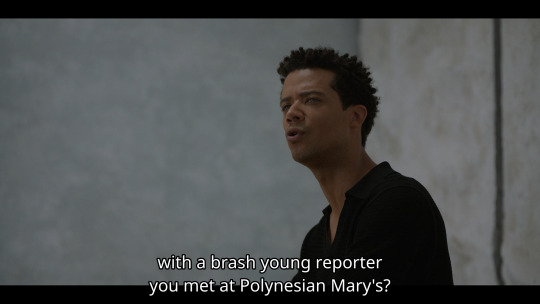
I think this conversation at the end of the episode (alongside Louis' speech to Daniel in San Francisco and them remembering it in 2.05) is the most important scene between Louis and Daniel. They share the understanding what it feels like to have children and love them so much you don't even have words for it, but still fail them. It's not a coincidence that in the original interview in San Francisco what leads to Louis attacking Daniel is Louis telling the story of Claudia leaving alone and Louis going back to Lestat, and Daniel acting dismissively and clearly not understanding why this is so painful memory to Louis. Daniel was young, stupid and high - and he didn't have children yet. Daniel now wouldn't act like that when hearing this story, and he doesn't in 1.06 when hearing it again. And notably when Louis says that he would now agree to turn Daniel, Daniel says he doesn't want it anymore and specifically mentions his daughters as one of the reasons. Having to watch your children die before you is the most horrifying thing in the world. It's something Louis had to go through and Daniel wishes he never has to, even if vampirism still intrigues him.
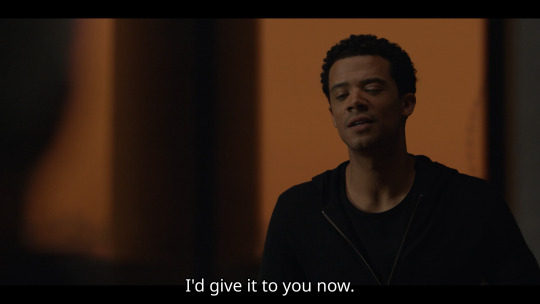
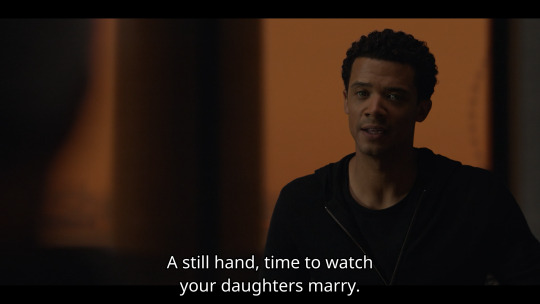
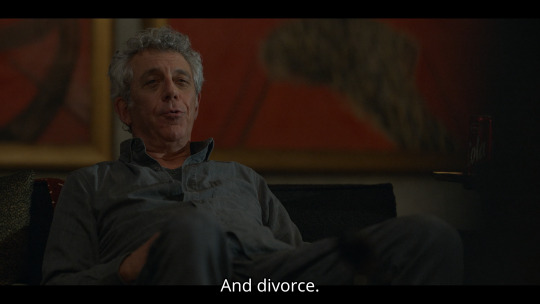
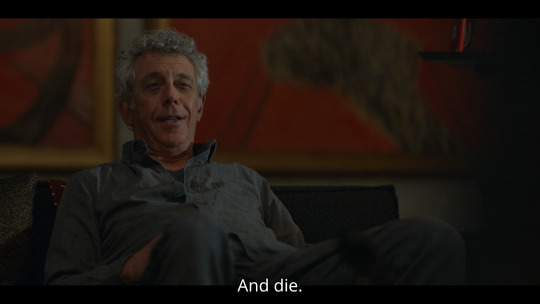
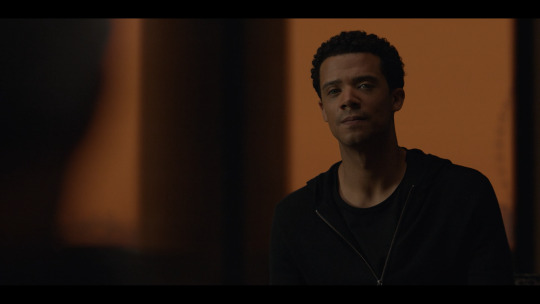
Daniel realizes quickly that it all comes down to Louis' feelings of guilt and shame about failing Claudia and his inability to protect her, because he has similar feelings about his own daughters. Louis' story unravels in s1 finale because Daniel recognizes that Louis' more palatable narrative around what happened with Claudia isn't fully true. Daniel carefully read through Claudia's diaries and tried to learn to understand her, and he positions himself as someone who's trying to defend her integrity and reveal the injustice that was done to her. This is again about Daniel's own children as much as it's about Claudia. He knows that he's a bad father, his daughters don't talk to him anymore and it's implied that he neglected them when focusing on other things that interested him more. When Daniel defends Claudia he's on some level trying to rectify his own mistakes and when he calls Louis out he's also voicing his own self-loathing.
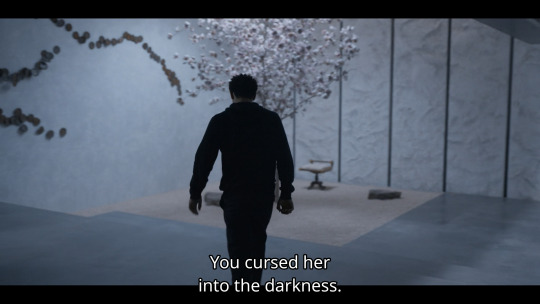
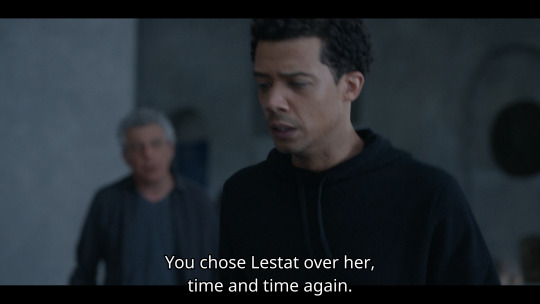
Eric Bogosian remarked that the scene in 2.01 where Louis cries and thanks for Daniel for helping him to remember that Claudia could dream is another shift in their dynamic. Daniel looks at Louis with genuine concern, and after that he tones down his usual sarcasm and jabs significantly. Daniel, again, can sympathize with how important this is for Louis. There's a new sincerity and empathy in their interactions. Sometimes the audience forgets that this story is ultimately about Claudia, but Daniel hasn't forgotten it since he first realized it. They're trying to understand together what happened to Louis' child and everything that led to it. I think if Daniel wasn't a father he would've acted differently, and Louis wouldn't have trusted him in the same way either and been able to share his and Claudia's story. I think this shared sorrow, love and guilt they feel as fathers is one of the most crucial parts of their connection.
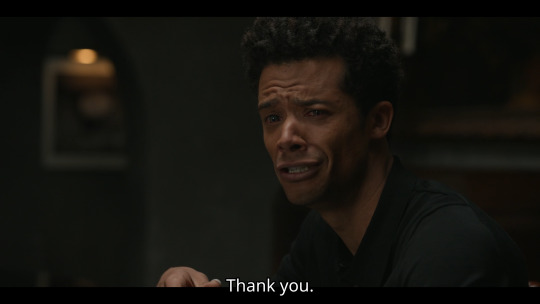
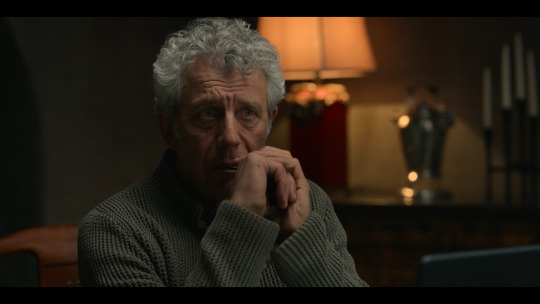
#iwtv#iwtvposting#danlou#this is mostly about daniel and louis but a bit of armand too#daniel molloy#interview with the vampire
228 notes
·
View notes
Note
Hi! I was wondering if you knew anything in particular about the Lincoln Park Zoo- I think it’s the only zoo I’ve ever been to that’s free/no admission! Especially considering the scale. The only thing that concerned me was that their polar bears seem to have a history of stereotypical behaviors (pacing, primarily) which I saw while I was there, but again, I’m a total outsider to the actual inner workings of the facility. Sorry if this is too vague, haha.
There's a couple city zoos like that with free entrance! It's a cool option, and indicative of the city providing enough funding for the facility to operate without the need for income from tickets. (Sometimes the way things are set up, I think they can be required to stay free). The St. Louis Zoo is another!
I don't know a lot about the Lincoln Park Zoo beyond what I've seen as a guest. I've gone a couple times and haven't seen anything that stood out to me as major red flags, but that's just from a public perspective and not a comprehensive assessment. They're AZA-accredited and have been for a long time, which is an indication of their general ethos and operations. I can't speak to more than that about their quality, unfortunately.
You're right about the polar bear stereotypies - that's a thing I've seen for myself. The thing is, with stereotypies - and especially with polar bears - they're not necessarily an indicator of current welfare or quality of life.
For folk who are new to the blog or unfamiliar with the concept, in animal care, a stereotypy is a "repetitive, invariant behavior pattern with no obvious goal or function." Examples often seen are repetitive pacing, head-bobbing, licking or chewing, and rocking or swaying. (It's important to note that not all repetitive behaviors are stereotypic behaviors - e.g. animals may pace when excited and anticipating the arrival of a keeper). Stereotypies can be an indicator of chronically poor welfare, under-stimulating enrichment, or inappropriate captive environments, but the important thing to know about that is that they often persist after the problem that caused them is resolved. So you can take a polar bear or an elephant that picked up a stereotypic behavior in one zoo and move them to another, much better situation, and they may still continue the stereotypy.
(The fact that stereotypies can be indicators of previous, but not current, welfare problems is a really important nuance that is often left out of discussions. Sometimes they're called "zoochosis", which anti-captivity folk define as "the psychosis induced by captivity"... but that's a very unscientific approach, and doesn't facilitate productive discussion or attempts to identify causes and alleviate the behavior. Zoochosis is nothing but a useless manipulative buzzword, folks.)
Bears in general seem to be prone to stereotypies in captive situations. I've seen some recent research that hypothesizes it's likely due to a lack of ability to engage in normal behavioral sequences, such as foraging. Polar bears seem especially prone to it. One 2013 study found that of the 55 polar bears in North America they assessed, 85% engaged in stereotypical pacing. It might be because they natural cover such a huge range in the wild that older, smaller exhibits haven't allowed them to move as much as they need to; it could also be due to a historical lack of appropriate enrichment. We don't really know, because there's so many potential factors, and the long lifespan of polar bears means longitudinal studies of multiple generations take a very long time.
These are both things the industry is working on fixing: newer polar bear exhibits are built to be much larger and more complex, and there's been a heavy focus in the literature for at least a decade on finding ways to reduce stereotypies by providing engaging enrichment and increasing bears' activity levels. Lincoln Park Zoo's polar bear habitat was renovated in 2016, and - while it looks rather boring to me, as a guest - it was apparently designed to allow for a lot of activity range and polar bear-specific needs.
Their current bears are both about 20 years old, and were transferred to the Lincoln Park Zoo after the new habitat was completed. It's entirely plausible the bears arrived with stereotypies from their previous facilities, given that the emphasis on improving polar bear care is younger than they are. Here's a photo I took there a couple years ago, of Talini (I think), engaging in a repetitive head tossing behavior. It's definitely hard to watch, as a guest, and I don't remember if they had signage up about it.

That all being said, I wouldn't judge the whole zoo based on the polar bear stereotypies, because there's so much at play there in terms of history and the evolution of care for the species. What's important is how they're handling it, and what they're doing to help encourage more normative behavior from the bears. Given the amount of research and effort the zoo field has put into addressing the topic in polar bears for the last decade, it's highly probable that a lot of staff time goes into helping reduce the amount of time those bears spend engaging in stereotypies.
270 notes
·
View notes
Text
Armand called Lestat a clown in the most round about way
s2e3 hot wired the two passions in my brain into this info dump, however seeing as a central theme of this episode (and the season) is power, status, and their subversions, it seems relevant. for context, I have 2 degrees in theatre, specifically theatre history and how trends effect form. (I am in no way an expert though, and this is very simplified). long story short, I'm relishing in being a big ol nerd about this entire season
FINALLY, we got to see Lestat (a version of) strutting his stuff on stage in a scene with peak commedia dell'arte shenanigans. Commedia dell'arte is/was an originally Italian form of theatre which was defined by lazzi (comedic bits), improv, and stock characters. these stock characters have been around from Roman times and are still super familiar to us today - the young lovers, the pervy old rich man, the soldier with bravado, etc. It's been seen as a somewhat formulaic form of theatre which relied on quickly identifiable characters and situations so audiences can sit back and enjoy the butt jokes and servant beatings.
In the book - specifically The Vampire Lestat - our beloved Lestat RELISHES in playing a character called Lelio, one of the young lovers. It is in playing Lelio that he "found a tongue for verses and wit [he]'d never had in life" (TVL pg 31). It is in playing Lelio that Lestat first gets a taste of the person he can become, and it is in Lelio that we see the first glimpses of the Lestat which so fully seduces Louis. In short, Lestat casts himself as the suave and handsome romantic protagonist, here to sweep people off their feet. The young lovers are also notably some of the only roles portrayed without masks, to emphasize their youth and natural beauty.
SO IMAGINE MY SURPRISE WHEN LESTAT SHOWS UP IN S2E3 DRESSED LIKE THIS:
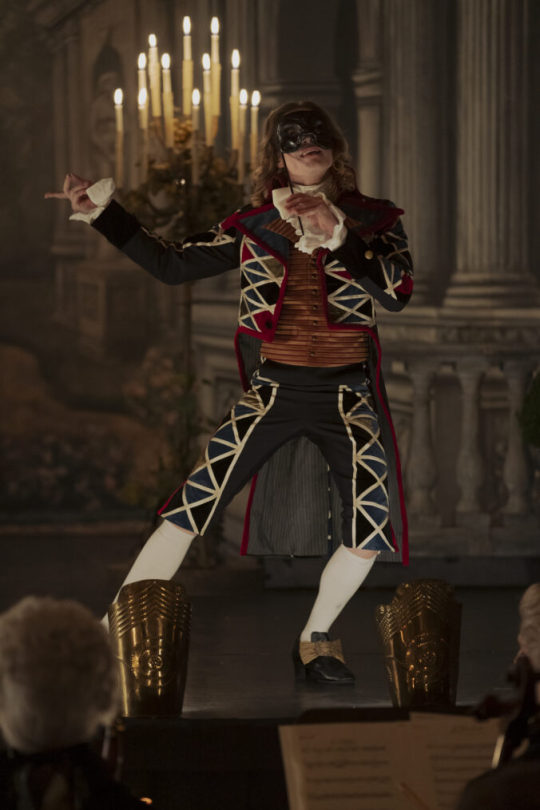
He has a half mask! He's wearing all sorts of colors! He's clearly acting as a go between between two other characters who seem to be of a higher status than him! As I said before, commedia dell'arte can be very formulaic (especially by the late 1700s when it is being codified away from being improv focused to being cemented into scripts). From all of these visual and characterization clues, Lestat is not playing Lelio the young lover, he's playing a Harlequin! And his costume seems to be heavily based off of this Harlequin (Arlecchino, Arlecino, etc.) which is literally the wikipedia image of a Harlequin.
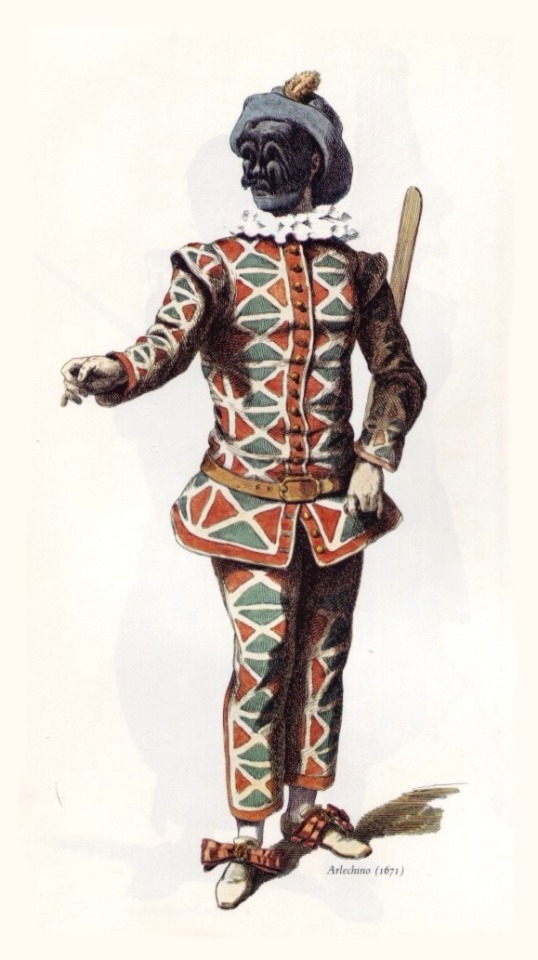
(note, if you give a fuck, this image is depicting an Arlechino from 1671, roughly 125 years before Lestat on stage. in my mind, this accounts for the changes in silhouette, styling, why Lestat doesn't wear the mask for the entirety of the performance, etc. Also, just while we're talking about costuming, I believe the late 18th Century was still a time in which actors would have been expected to provide their own costumes, which would explain why Lestat's version is made with expensive fabrics and includes cunty little details like the bow in his hair. At the very least, I can see him making looking good a priority as the owner of the theater and as...well...Lestat.)
Okay, okay, okay. Why does this matter?
Harlequins are not characters of any social status. They're servants who are quick witted enough to get into antics but stupid enough to be commanded by animalistic instincts (lust, food, you name it). The Harlequin being beaten by their master was ENORMOUSLY funny, and is the origin of the term "slapstick comedy". They a memorable iteration of clown.
In this scene, which I'm willing to bet was inspired by (if not outright) Carlo Goldoni's A Servant of Two Masters, Lestat plays a servant who interacts with two characters. One appears to be a young woman in a breeches part - another common trope of commedia performance. The other appears to be the young male lover! We see Lestat prancing between the two, seemingly facilitating some romance plot, being paid for his compliance, and doing a good ol fashioned butt lazzi. (Could he be presenting his ass for beating? Maybe.)
So why is Lestat not the young valiant lover, but instead A LITERAL CLOWN? Three potential, not conflicting, reasons. By the time Lestat is performing (mid to late 1790s, based off Armand's earlier comment about Robespierre's 1794 execution), the Harlequin characters were the most sought after roles! At this time, we are seeing the emergence of "Celebrity Culture" where audiences sought out actors for their off-stage personalities as much as their on-stage ones. This is an extremely fitting position for Lestat to fall into. Yay a semblance of historical accuracy!
Secondly, Lestat's ENTIRE ROLE in season two is to come between this season's new pair of young(ish) lovers: Louis & Armand. Lestat's function is to repeatedly detract and distract from their relationship through Dreamstat's antics (appearing at the piano calling Louis a whore, having Louis re-kill him, etc.). Additionally, simply put, Lestat (and Sam Reid as Lestat) is a lot of fun to watch. He is absolutely a stand out (if not THE stand out) of the show! His constant ability to serve cunt is often what your eye is drawn to, he pulls focus to himself, and often undercuts the more subdued, philosophical, and morose nature of others. Both on-stage and on-screen, Lestat continuously upstages his screen partners. He does kinda function as a Harlequin. But in the end, the Harlequin's antics are also what ultimately drive the young lovers together. If not for Lestat's actions, Louis and Armand would have never met nor bonded over knowing this fucked up brat prince.
But we also have to remember! This portion of the episode is presented by Armand the mind fuckery master. It is absolutely in his best interests to paint Lestat as some sort of ridiculous, lesser being driven by animalistic nature. Especially if - by extension of the metaphor - this frames he and Louis as the virtuous and optimistic young lovers, striving to cling to each other in a world of chaos. I would be EXTREMELY interested to see if, when recollected by someone else, Lestat appears in a different role or characterized differently.
Again, given the celebrity culture of the time and Lestat being himself, it is entirely believable that he would appear in the Harlequin role (Truffaldino, if this is Goldoni's Servant). However, I think it's extremely telling that in Armand's iteration of the story Lestat is not the dignified, refined, and sympathetic young romantic. He is instead a literal fucking clown.
#amc iwtv#iwtv#memory is a monster#loustat#loumand#interview with the vampire#lestat#lestat de lioncourt#the vampire lestat#sam reid#commedia dell'arte#louis de pointe du lac#the vampire armand#armand#theatre#theatre des vampires#long post#claudia iwtv#theatre history
339 notes
·
View notes
Text







current wardrobe shopping list 💻💕💵:
around this time of year i always like making clothing wishlists for the fall and winter, and my wardrobe naturally shifts for the spring and summer. i always seem to slightly tweak my personal look around this time of year to make sure my wardrobe is true to me! prissy girl 4 life! 💓🍰
tops:
lace bandeaus for layering, feather trimmed button down tops, knitted fuzzy fitted tops, fur trimmed half jackets and crop tops, rhinestone lettered shirts, victoria’s secret off shoulder sweaters, lace camis, off shoulder knitted tops in my color palette, satin button downs, sheer tops, lululemon strawberry milkshake define jacket, fur collar leather jacket, oversized sweaters in pink and black, basic neutral long sleeved cotton tops
bottoms:
microscopic boy shorts with cute details, leather mini skirt, tartan plaid mini skirt, fold over yoga pants, lace trimmed skirt, miss me embellished skinny jeans, denim pleated skirt, houndstooth mini skirt, leather flare pants, fur/feather skirt
dresses + etc.:
ribbed knit bodysuit, pink and black rompers for layering, cotton bodysuits in my color palette, rhinestone skims dresses, hidden cult distressed pink halter dress, skims slip dresses, knit bodysuits, i am gia tracksuits in black and pink, pink jacket and legging set, solid black leggings, gray leggings, pink body by tracy set, black and pink fine girl set, new pink workout set
accessories:
knitted knee high socks, sheer socks, fuzzy beret, baby phat belt, fur headbands, fuzzy leg warmers, lace tights, diamond hair clips
jewelry:
anklets, new pandora charms, body chains, bling nostril hoops, bow ring and necklace, tiara charm bracelet and necklace, diamond encrusted hoops, tiffany toggle choker, dainty tennis bracelets, new cute belly rings
purses:
medium ballerina telfar, hello kitty wallet, heaven sent leopard print wallet, tory burch ella tote, juicy couture wristlet, louis vuitton speedy 30, rhinestone encrusted purse, feather satchel, hello kitty purse, pink puffer tote, victoria’s secret glitter tote, burberry satchel, ruffled pink purse, juicy couture 2022 bowler bag
shoes:
fuzzy boots in pink and gray, black kitten heels, pink closed toe pumps, jelly platform sandals, white fur bearpaw boots, y.r.u. qrystal pink platforms, juicy couture fur slides, total temptress heels, sequin uggs, pink fur platform sandals, sherpa lined pink crocs, sparkly heels, strappy heels, mary janes
483 notes
·
View notes
Text
I haven't been able to get Claudia's line "I never thought about choosing to pretend, life hasn't been kind enough to allow me that" out of my head and how it really is THEE Claudia thesis (and in some ways a thesis for the whole show).
Because performance really does define every single character in this show, as does the degree to which that character has chosen that particular performance or whether it's something the world/other people/necessity has imposed on them. On one hand you have white men like Lestat and Santiago up on stages by choice performing these romantic/intimidating/charismatic roles. And then you have both Louis and Armand who are both people who, in different ways, have had to essentially be chameleons their whole lives just to survive. But for both of them there's a sense that it becomes, to some extent, something they simply cannot emotionally break free from rather than a material necessity for the sake of survival (and obviously the necessity never goes away for either them entirely, but they're both also very much characters prone to getting trapped in cages of their own making).
And then you have Claudia who is so DESPERATE to just be herself and to be seen. I read a great interview with Delainey recently when she says that she thinks of Claudia as probably the most honest and reliable narrator in the story and I think she's absolutely right, Claudia is not duplicitous by nature. It's that she has simply never once in her life been in a situation where she wasn't forced to perform to survive. As a young black girl in the early 1900s. As an adult woman in the body of a child who must perform childishness in order to not seem monstrous and disturbing. As a young woman living in an abusive home where she has to navigate an angry man's moods. As Louis' loving sister/daughter and emotional tether. When has she ever had the chance to CHOOSE to pretend, just for the sake of it, in all of that?
We see her watching Santiago on stage performing as this romantic yet intimidating personification of death and she is ENTHRALLED. It's a power fantasy she desperately wants for herself, but when she's finally allowed on stage there's no seductive power fantasy waiting for her, just the same humiliating child role she's played her whole life and once again she has no choice in the matter.
149 notes
·
View notes
Text
Armand might be dissociated from his body on some level, in the sense that it’s not him so much as it is this thing the concept of Armand occupies and is defined by. It’s a foreign object he lives in, and it’s a foreign object that defines him, but ultimately whatever happens to the foreign object is fine, because it’s simply how life goes. Things happen to bodies. Things happen to people. Pointless trying to escape this cycle. It’s the most fundamental rule of the world. Arun got sold, Amadeo got bought, and Armand’s neither and both of those people anymore, and it was all a lifetime ago and it means nothing and it’s not who he is, and it’s also all he’ll ever be. I wonder if he delineates his life like this in his mind. Once upon a time, there was this boy named Arun from Delhi, and then he got sold to a ship captain. Some time later, there was this boy named Amadeo who lived with his lover, master, and teacher Marius, then one day Amadeo got turned by Marius, and Amadeo became a vampire. Then, in a different city, in a different time, there was a vampire named Armand and he led a coven and he worshipped God through Satan and he met this vampire named Lestat. Then some time later, there was a vampire named Armand, and he ran a theatre. Then there was a vampire named Armand, and he was married to a vampire named Louis. Then there was nothing. Near little sections. You see it in how he describes his life, weaving in between first and third person because it’s still too painful to identify with those memories, so the only way he can talk about it is by pretending he’s talking about someone else. It was so long ago. It can’t still define him. A million mortal lifetimes come and gone between Arun and Armand. He can’t still be the boy he was on that ship. He can’t be someone if he’s not that boy on the ship. There’s no present without history. I think it’s a loop that eats him up, the repeated identification and de-identification as he tries to unspool who he is. The tragedy is that he’ll probably never have a satisfactory answer, because there are too many missing pieces. If you spend your life structured around the needs and desires of other people then there’s really no space left for you. I do think Armand has a personality, but I don’t think that means he can recognize himself in the mirror. I don’t know if he has an identity. It’s just another story he tells. Half-blank, half-apocalyptic.
144 notes
·
View notes
Text
I’ve been thinking about how much of the Théâtre de Vampires’ MO is defined by/operating from fear. The premise of the theatre is the fantasy of the vampires’ mass power, the idea that they can get away with murdering humans in front of their own. However, the whole thing is an illusion relying on the audience’s suspension of disbelief—and the humans in the audience could rise up and massacre them if they knew the truth (just look at all the damage that one little Louis managed!). The Great Laws as regulations—not writing the history of the vampires, not revealing oneself to humans, even things like not making vampires without the coven leader’s permission—serve fundamentally to protect vampires by helping them avoid detection. And the T de V’s strict adherence to them reveals a deep-seated anxiety about external (and internal threats).
Armand asks, “Why is it, Louis, that those with the most power are often the weakest?” What often drives this weakness? Fear. Is it so surprising, in this context, that Armand chooses the coven over Louis who is not careful like that (the mingling with humans, the leaving mutilated corpses in the park)? (The open front door to Louis and Claudia’s Paris apartment reads to me as so loaded right now. Armand says: ”Cavalier. But I’m sure you’re being careful.”) We can also consider how Armand's actions in the 1973 and 2022 timeline are fear-motivated. I’m also thinking here about @pirateshelly’s great piece on vampirism and powerlessness.
The show examines how abuses of power often stem from fear—just look at the way Lestat conducts himself out of his fear of loss! And that’s why Louis’ giving the interview and doxxing himself globally on vampire radio, while somewhat unhinged actions, make sense. In reaction to these examples, he’s not going to cower and let fear/regulation rule his life. Compared to the show’s other vamps Louis has relatively little power—he’s younger, he burns easy, but look how he mobilizes that power! And that’s how he’s going to escape the cycle of abuse, wisely or not: by confronting the sources of fear head-on and refusing to let them have power over him.
91 notes
·
View notes
Text
Les Mis French History Timeline: all the context you need to know to understand Les Mis
Here is a simple timeline of French history as it relates to events in Les Miserables, and to the context of Les Mis's publication!
A post like this would’ve really helped me four years ago, when I knew very little about 1830s France or the goals of Les Amis, so I’m making it now that I have the information to share! ^_^
This post will be split into 4 sections: a quick overview of important terms, the history before the novel that’s important to the character's backstories, the history during the novel, and then the history relevant to the 1848-onward circumstances of Hugo’s life and the novel’s publication.
Part 1: Overview
The novel takes place in the aftermath of the Battle of Waterloo, during a period called the Restoration.
The ancient monarchy was overthrown during the French Revolution. After a series of political struggles the revolutionary government was eventually replaced by an empire under Napoleon. Then Napoleon was defeated and sent into exile— but then he briefly came back and seized power for one hundred days—! and then he was defeated yet again for good at the battle of Waterloo in 1815.
After all that political turmoil, kings have been "restored" to the throne of France. The novel begins right as this Restoration begins.
The major political parties important to generally understanding Les Mis (Wildly Oversimplified) are Republicans, Liberals, Bonapartists, and Royalists. It’s worth noting that all these ‘party terms’ changed in meaning/goals over time depending on which type of government was in power. In general though, and just for the sake of reading Les Mis:
Republicans want a Republic, where people elect their leaders democratically— they’re the very left wing progressive ones, and are heavily outcast/censored/policed. Les Amis are Republicans.
Liberals: we don’t have time to go into it, but I don’t think there are any characters in Les Mis defined by their liberalism.
Bonapartists are followers of Napoleon Bonaparte I, who led the Empire. Many viewed the Emperor as more favorable or progressive to them than a king would be. Georges Pontmercy is a Bonapartist, as is Pere Fauchelevent.
Royalists believe in the divine right of Kings; they’re conservative. Someone who is extremely royalist to the point of wanting basically no limits on the king’s power at all are called “Ultraroyalists” or “ultra.” Marius’s conservative grandfather Gillenromand is an ultra royalist.
Hugo is also very concerned with criticizing the "Great Man of History," the view that history is pushed forward by the actions of a handful of special great men like kings and emperors. Les Mis aims to focus on the common masses of people who push history forward instead.
Part 2: Timeline of History involved in characters’ Backstories
1789– the March on the bastille/ the beginning of the original French Revolution. A young Myriel, who is then a shallow married aristocrat, flees the country. His family is badly hurt by the Revolution. His wife dies in exile.
1793– Louis XVI is found guilty of committing treason and sentenced to death. The Conventionist G—, the old revolutionary who Myriel talks to, votes against the death of the king.
1795: the Directory rules France. Throughout much of the revolution, including this period, the country is undergoing “dechristianization” policies. Fantine is born at this time. Because the church is not in power as a result of dechristianization, Fantine is unbaptized and has no record of a legal given name, instead going by the nickname Fantine (“enfantine,” childlike.)
1795: The Revolutionary government becomes more conservative. Jean Valjean is arrested.
1804: Napoleon officially crowns himself Emperor of France. the Revolution’s dream of a Republic is dead for a bit. At this time, Myriel returns from his exile and settles down in the provinces of France to work as a humble priest. Then he visits Paris and makes a snarky comment to Napoleon, and Napoleon finds him so witty that he appoints him Bishop.
Part 3: the novel actually begins
1815: Napoleon is defeated at the Battle of Waterloo by the allied nations of Britain and Prussia. Read Hugo’s take on that in the Waterloo Digression! He gets a lot of facts wrong, but that’s Hugo for you.
Marius’s father, Baron Pontmercy, nearly dies on the battlefield. Thenardier steals his belongings.
After Napoleon is defeated, a king is restored to the throne— Louis XVIII, of the House of Bourbon, the ancient royal house that ruled France before the Revolution. In order to ensure that Louis XVIII stays on the throne, the nations of Britian, Prussia, and Russia, send soldiers occupy France. So France is, during the early events of the novel, being occupied by foreign soldiers. This is part of why there are so many references to soldiers on the streets and garrisons and barracks throughout the early portions of the novel. The occupation officially ended in 1818.
1815 (a few months after Waterloo): Jean Valjean is released from prison and walks down the road to Digne, the very same road Napoleon charged down during his last attempt to seize power. Many of the inns he passes by are run by people advertising their connections to Napoleon. Symbolically Valjean is the poor man returning from exile into France, just as Napoleon was the Great Man briefly returning from exile during the 100 days, or King Louis XVIII is the Great King returning from exile to a restored throne.
1817: The Year 1817, which Hugo has a whole chapter-digression about. Louis XVIII of the House of Bourbon is on the throne. Fantine, “the nameless child of the Directory,” is abandoned by Tholomyes.
1821: Napoleon dies in exile.
1825: King Louis XVIII dies. Charles X takes the throne. While Louis XVIII was willing to compromise, Charles X is a far more conservative ultra-royalist. He attempts to bring back something like the Pre-Revolution style of monarchy.
Underground resistance groups, including Republican groups like Les Amis, plot against him.
1827-1828: Georges Pontmercy, bonapartist veteran of Waterloo, dies. Marius, who has been growing up with his abusive Ultra-royalist grandfather and mindlessly repeating his ultra-royalist politics, learns how much his father loved him. He becomes a democratic Bonapartist.
Marius is a little bit late to everything though. He shouts “long live the Emperor!” Even though Napoleon died in 1821 and insults his grandfather by telling him “down with that hog Louis XVIII” even though Louis XVIII has been dead since 1825. He’s a little confused but he’s got the spirit.
Marius leaves his grandfather to live on his own.
1830: “The July Revolution,” also known as the “Three Glorious Days” or “the Second French Revolution.” Rebels built barricades and successfully forced Charles X out of power.
Unfortunately, TL;DR moderate politicians prevented the creation of a Republic and instead installed another more politically progressive king — Louis-Philippe, of the house of Orleans.
Louis-Philippe was a relative of the royal family, had lived in poverty for a time, and described himself as “the citizen-king.” Hugo’s take on him is that he was a good man, but being a king is inherently evil; monarchy is a bad system even if a “good” dictator is on the throne.
The shadow of 1830 is important to Les Mis, and there’s even a whole digression about it in “A Few Pages of History,” a digression most people adapting the novel have clearly skipped. Les Amis would’ve probably been involved in it....though interestingly, only Gavroche and maybe Enjolras are explicitly confirmed to have been there, Gavroche telling Enjolras he participated “when we had that dispute with Charles X.”
Sadly we're following Marius (not Les Amis) in 1830. Hugo mentions that Marius is always too busy thinking to actually participate in political movements. He notes that Marius was pleased by 1830 because he thinks it is a sign of progress, but that he was too dreamy to be involved in it.
1831: in “A Few Pages of History” Hugo describes the various ways Republican groups were plotting what what would later become the June Rebellion– the way resistance groups had underground meetings, spread propaganda with pamphlets, smuggled in gunpowder, etc.
Spring of 1832: there is a massive pandemic of cholera in Paris that exacerbates existing tensions. Marius is described as too distracted by love to notice all the people dying of cholera.
June 1st, 1832: General Lamarque, a member of parliament often critical of the monarchy, dies of cholera.
June 5th and 6th, 1832: the June Rebellion of 1832:
Republicans, students, and workers attempt to overthrow the monarchy, and finally get a democratic Republic For Real This Time. The rebellion is violently crushed by the National Guard.
Enjolras was partially inspired by Charles Jeanne, who led the barricades at Saint-Merry.
Part 4: the context of Les Mis’s publication
February 1848: a successful revolution finally overthrows King Louis Philippe. A younger Victor Hugo, who was appointed a peer of France by Louis-Philippe, is then elected as a representative of Paris in the provisional revolutionary government.
June 1848: This is a lot, and it’s a thing even Hugo’s biographers often gloss over, because it’s a horrific moral failure/complexity of Hugo’s that is completely at odds with the sort of politics he later became known for. The short summary is that in June 1848 there was a working-class rebellion against new labor laws/forced conscription, and Victor Hugo was on the “wrong side of the barricades” working with the government to violently suppress the rebels. To quote from this source:
Much to the disappointment of his supporters, in [Victor Hugo’s] first speech in the national assembly he went after the ateliers or national workshops, which had been a major demand of the workers. Two days later the workshops were closed, workers under twenty-five were conscripted and the rest sent to the countryside. It was a “political purge” and a declaration of war on the Parisian working class that set into motion the June Days, or the second revolution of 1848—an uprising lauded by Marx as one of the first workers’ revolutions. As the barricades went up in Paris, Hugo was tragically on the wrong side. On June 24 the national assembly declared a state of siege with Hugo’s support.
Hugo would then sink to a new political low. He was chosen as one of sixty representatives “to go and inform the insurgents that a state of siege existed and that Cavaignac [the officer who had led the suppression of the June revolt] was in control.” With an express mission “to stop the spilling of blood,” Hugo took up arms against the workers of Paris. Thus, Hugo, voice of the voiceless and hero of workers, helped to violently suppress a rebellion led by people whom he in many ways supported—and many of whom supported him. With twisted logic and an even more twisted conscience, Hugo fought and risked his life to crush the June insurrection.
There is an otherwise baffling chapter in Les Mis titled "The Charybdis of the Faubourg Saint Antoine and the Scylla of the Fauborg Du Temple," where Hugo goes on a digression about June of 1848. Hugo contrasts June of 1848 with other rebellions, and insists that the June 1848 Rebellion was Wrong and Different. It is a strangely anti-rebellion classist chapter that feels discordant with the rest of the book. This is because it is Hugo's effort to (indirectly) address criticisms people had of his own involvement in June 1848, and to justify why he believed crushing that rebellion with so much force was necessary. The chapter is often misused to say that Hugo was "anti-violent-rebellion all the time" (which he wasn't) or that "rebellion is bad” is the message of Les Mis (which it isn't) ........but in reality the chapter is about Hugo attempting to justify his own past actions to the reader and to himself, actions which many people on his side of the political spectrum considered a betrayal. He couldn't really have written a novel about the politics of barricades without addressing his actions in June 1848, and he addressed them by attempting to justify them, and he attempted to justify them with a lot of deeply questionable rhetoric.
1848 is a lot, and I don't fully understand all the context yet-- but that general context is necessary to understand why the chapter is even in the novel.
Late 1848/1849:
Quoting from the earlier source again:
In the wake of the revolution, Hugo tried to make sense of the events of 1848. He tried to straddle the growing polarization between, on the one hand, “the party of order,” which coalesced around Napoleon’s nephew Louis-Napoleon Bonaparte, who in December 1848 had been elected France’s president under a new constitution, and the “party of movement” (or radical Left) that, in the aftermath of 1848, had made considerable advances. In this climate, as Hugo increasingly spoke out, and faced opposition and repression himself, he was radicalized and turned to the Left for support against the tyranny and “barbarism” he saw in the government of Louis Napoleon.
The “point of no return” came in 1849. Hugo became one of the loudest and most prominent voices of opposition to Louis Napoleon. In his final and most famous insult to Napoleon, he asked: “Just because we had Napoleon le Grand [Napoleon the Great], do we have to have Napoleon le petit [Napoleon the small]?” Immune from punishment because of his role in the government, Bonaparte retaliated by shutting down Hugo’s newspaper and arresting both his sons.
Thenardier is possibly meant to be Hugo’s caricature of Louis-Napoleon/Napoleon III. He is “Napoleon the small,” an opportunistic scumbag leeching off the legacy of Waterloo and Napoleon to give himself some respectability. He is a metaphorical ‘graverobber of Waterloo’ who has all of Napoleon’s dictatorial pettiness without any of his redeeming qualities.
It’s also worth noting that Marius is Victor “Marie” Hugo’s self-insert. Hugo’s politics changed wildly over time. Like Marius he was a royalist when was young. And like Marius, he looked up to Napoleon and to Napoleon III, before his views of them were shattered. This is reflected in the way Marius has complicated feelings of loyalty to his father (who’s very connected to the original Napoleon I) and to Thenardier (who’s arguably an analogue for Napoleon IiI.)
1851:
On December 2, 1851, Louis Napoleon launched his coup, suspending the republic’s constitution he had sworn to uphold. The National Assembly was occupied by troops. Hugo responded by trying to rally people to the barricades to defend Paris against Napoleon’s seizure of power. Protesters were met with brutal repression.
Under increasing threat to his own life, with both of his sons in jail and his death falsely announced, Hugo finally left Paris.
He ultimately ended up on the island of Guernsey where he spent much of the next eighteen years and where he would write the bulk of Les Misérables. It was from here that his most radical and political work was smuggled into France.
Hugo arguably did some of his most important political work after being exiled. In Guernsey, he aided with resistance against the regime of Napoleon III. Hugo’s popularity with the masses also meant that his exile was massive news, and a thing all readers of Les Miserables would’ve been deeply familiar with.
This is why there are so many bits of Les Mis where the narrator nostalgically reflects on how much they wish they were in Paris again —these parts are very political; readers would’ve picked up that this was Victor Hugo reflecting on he cruelty of his own exile.
1862-1863: Les Mis is published. It is a barely-veiled call to action against the government of Napoleon III, written about the June Rebellion instead of the current regime partially in order to dodge the censorship laws at the time.
Conservatives despise the book and call it the death of civilization and a dangerous rebellious evil godless text that encourages them to feel bad for the stupid evil criminal rebel poors and etc etc etc– (see @psalm22-6 ‘s excellent translations of the ancient conservative reviews)-- but the novel sells very well. Expressing approval or disapproval of the book is considered inherently political, but fortunately it remains unbanned.
…And that’s it! An ocean of basic historical context about Les Mis!
If anyone has any corrections or additions they would like to make, feel free to add them! I have researched to the best of my ability, but I don’t pretend to be perfect.
I also recommend listening to the Siecle podcast, which covers the events of the Bourbon Restoration starting at the Battle of Waterloo, if you're interested in learning more about the period!
#les mis#someone in a discord server asked about this a while back#so i put it together!#it’s basically what I told them in the discord server but as a tumblr post#and with some extra stuff I forgot to say#but yeAH maybe if more historical information gets spread#we’ll get more canon era fanfics >:3333#which are always fun
448 notes
·
View notes
Text

Upon request, today we have a rec list of fics with roadtrips! This is the perfect summer rec list, so we hope you check out these incredible fics and show them some love. If you enjoy our rec lists, please be sure to like and reblog this post to help spread the word. Happy reading!
1) Enjoy The Ride | Not Rated | 11,103 words
“Stop sulking and get up. I have a proposition to make.”
“Niall?” Louis questioned. “Do you think I should put glow in the dark stars on my ceiling?”
He looked over and found Niall giving him an unimpressed look.
“So, no?” Louis asked. “No stars?”
“We’re going on a road trip,” Niall stated.
Louis looked back at his starless ceiling and waved farewell to Niall. “Cool. Have fun!”
“No, you idiot.” Niall let out a frustrated sigh. “You, me, Liam, and Harry.”
Louis glanced over to Niall and back to the ceiling. “Who’s Harry?”
2) Kiss Me In Your Chevrolet | Explicit | 11,569 words
"Yes, Lou?" Harry asked, rubbing his tired eyes. A gust of wind came through the open windows, sending chills down Harry's arms as a light rain began falling outside. He closed his eyes again and let his head fall back to the couch arm rest.
"Can we go there?" Louis asked, probably pointing somewhere. Harry opened his eyes and felt his heart jump in his chest, a magazine page a couple of inches away from his face. Startled, Harry closed his eyes and breathed heavily, trying to collect himself.
Harry blinked a few times to focus his eyes on the page Louis still held in front of his nose. "You want to go to the Grand Canyon?" He furrowed his eyebrows, tilting his head to the left to look at Louis' face.
3) Love Is Like This; Not A Heartbeat, But A Moan | Explicit | 13,150 words
Note: This fic has been locked and can only be read by AO3 users.
"He hates this, more than anything in the world he hates this. His title, his rank, his DNA. Unchangeable. Fated.
And then there’s Harry, born to be unobjectively superior to Louis and all other O’s. Unlike other A’s, Harry doesn’t wear his alpha-ness very well. He’s clumsy with it, like walking around in a pair of shoes a size too big. His life is defined by uncertainty and tentativeness, and those are definitely not qualities alphas should have.
Sometimes, when Louis ponders it for too long, he thinks that maybe Harry resents being an A just as much as Louis resents being an O."
4) All I Want Is To Fall With You | Mature | 16,524 words
The pair looked at each other for a few moments before Harry moved forward and gathered Louis in an unexpected hug.
It was nice, but why the fuck was an unknown alpha hugging him? Maybe an even better question would be why did Louis feel so secure in this stranger's arms?
Harry quickly let go and Louis felt something pull at him.
"Sorry," Harry said, holding his hands up in surrender. "Shit, um, that just seemed a natural response for some reason. I’m so sorry."
Louis smiled up at the alpha. "It's okay. Thanks again, Harry."
"You're welcome. I know it's horrible weather, and less than optimal circumstances, but this was a brilliant meet-cute."
What the fuck was a meet-cute?
5) These Roads We Stumble Down | Explicit | 18,233 words
Harry picks up a hitchhiker in Oxford, and it's a long ride to Glasgow.
6) We’re Not Who We Used To Be | Explicit | 30,611 words
“Harry…” Louis’ voice catches in his throat, thick with tears threatening to fall out, so he coughs to clear it before trying again. “Harry is Liam’s best man?”
“You didn’t know?”
Harry is standing at the entrance of the garage, mouth slightly open and face pulled together. He sets his bag on the ground and puts his hands on his hips. When he does that, he looks just like the Harry that Louis remembers (and loves, he thinks with an aching heart).
“I’m sure I mentioned it,” Liam says, but Louis can tell he’s lying by the way he chews on his lower lip and twists his fingers together.
“You’re all a bunch of dick heads, I’m getting in the car.” Louis isn’t sure if he’s being unreasonable. He has no idea what the protocol is when your ex-boyfriend shows up after three years and nobody bothered to give you a heads up. He’s pretty sure he’s allowed to be upset about it, even if it’s only for a bit.
7) Take The Back Roads | Explicit | 31,333 words
Note: This fic has been locked and can only be read by AO3 users.
The one where Harry and Louis are roommates who are pining over each other and all they need is a road trip down the West Coast to bring them together.
8) Bluebird | Explicit | 39,046 words
The 2,789 miles between New York and Los Angeles is a long way to go alone.
9) From Dust To Lust | Explicit | 45,437 words
From the moment Louis set eyes on the gorgeous stranger across the airport terminal, he knew the guy was trouble, which was the last thing he wanted. He wouldn’t have thought spending two days cooped up in a car travelling from the Australian Outback to the East Coast would change his mind.
It’s funny how things work out.
10) Made For Lovin' You | Explicit | 52,637 words
“I’m in,” is all Louis receives. He blinks a few times, making sure he’s reading this right.
“For real?” he asks, just to be a hundred percent sure.
“Yes,” pops up. “How do you wanna pursue?” The alpha adds, like he’s on a special mission or something.
“I’m gonna call us a cab to go to mine. Once I know it’s here, I’ll leave and join you there,” Louis explains. “I’ll text you to go around five minutes before it arrives, so it doesn’t look suspicious, and our friends don’t notice us leaving together.”
“Noted.”
So Louis does, and ten minutes later, he’s sat in the backseat of a cab, next to Harry Styles, the person he hates the most but unfortunately still finds attractive. They’re on their way to fuck in Louis’ flat.
Splendid.
11) Waiting For The Tides To Meet | Explicit | 59,877 words
Soulmate AU. Everyone is born with heterochromia — one eye is their own eye colour, while the other is the colour of their soulmate's. It's only when they meet their soulmate for the first time that their own eyes match properly. After a hazy night at a frat party, Louis wakes up to blue eyes and the shocking realization that he had met his soulmate, without any sober recollection. Seven years pass where Louis comes to terms with the fact that he'll never know who his soulmate is. Then one fated summer, a beautiful green-eyed photographer arrives at Louis' workplace, with promises of endless laughter and a familiar feeling in Louis' heart.
12) Ghost Note Symphony | Explicit | 96,426 words
Louis is on tour when he first hears about it. It’s all over the news – Harry Styles Attacked By Fan runs in headlines for days. It’s not even just the gossip rags, either. Actual journalists are covering the story. It would have been impossible to avoid hearing about it.
Technically, Oli is the one who tells Louis about it, but it’s not exactly being covered up. Harry doesn’t answer Louis’ text asking if he’s alright, but that’s not really surprising. They haven’t spoken for months, and it’s been a lot longer than that since they’ve had a real conversation. The sting of the text going unanswered is still there, less painful than it might have been a few years ago.
It’s not that it’s easy to forget about, exactly. Louis has a whole life outside of One Direction now, though. So Louis goes on with his life, figuring that if Harry was seriously hurt he would have heard about it by now. He might currently be in the same country as Harry, but being on opposite sides of it puts enough distance between them that putting it in the back of his mind is easy. There’s nothing Louis could do, even if he thought Harry might want him to.
That’s why everything that happens next comes as a complete shock to him.
13) Nothing Worsens, Nothing Grows | Explicit | 102,528 words | Sequel
Another roadtrip AU featuring Harry as the misunderstood hipster, Louis as the bitter psych major, Liam as the one with the secret boyfriend, and Niall as the one who just wants everyone to be happy.
Check out our other fic rec lists by category here and by title here.
69 notes
·
View notes
Text
i want to write 500 pages on armand. the way his entire life has been defined by servitude. the fact that he is so powerful means so little when he was a slave, and then abruptly yanked from his master, and then put in charge of a coven to lead and keep under control. 500 years of that, and then louis. who embodies a freedom he has never known. who says he loves him and who takes control of the situation and gives armand a role to play again. and who he has now devoted his life to, in an effort of absolution, to make up for what happens to claudia. and like louis says, he plays the good nurse, he licks his boots, and to what end? louis is still pining for lestat. and armand understands it. because he fell for lestat too. but lestat didn’t want him. and louis doesn’t want him. but louis needs him. so armand will serve him until the end of time. he can’t trust louis not to run into the sun so he locks him in a tower. he can’t trust louis to remember so he alters his memories. he keeps louis like a pet for his own good and in turn louis gives him something to serve. a purpose. a way to be unalone in an immortal life. A Companion.
#i was texting june abt this and was like. this needs to be a post.#im sick. i just wanna talk about armand forever.#izzy.txt#iwtv#iwtv spoilers
136 notes
·
View notes
Text
TENTH LORD IN MARS NAKSHATRAS
Thanks for your patience in waiting for the next part of the series - I’m glad you guys are interested. As always, recorded for my own benefit, published for yours. General disclaimer is in my bio. Credit to KRSchannel for inspiring this post.
Find your 10th lord here, and find your 10th lord’s nakshatra here.
The 10th house rules our life’s honor. It represents the services we perform for society as well as the reputation we earn as a result. It is associated with the father and the career because traditionally, this is where both our standing in society and the role we performed in society would come from - inherited through the father’s family line. However, in our contemporary world, this isn’t always the case, which is why it’s important to know the grander themes at play.
The three Mars-ruled nakshatras are Mrigashira, Chitra, and Dhanistha.
Mars is a planetary object that represents motivation, force of will, and personal drive. It is the pursuit of pleasure and the incurring of wrath. While Venus rules earthly and rational matters, such as the aesthetic of beauty and the value of wealth, Mars rules our desires which are primal and sublime. He is impulse, passion, giving us strength and making us vulnerable simultaneously. He is also fear and terror. More than any traditional planet, Mars is tied to the cycle and the transformation of life and death, as the ruler of the 1st and 8th house. His impact is severe, earnest, and compelling, and is escaped by no one.
DO YOU HAVE YOUR 10TH LORD IN A MARS-RULED NAKSHATRA? THAT MEANS YOU…
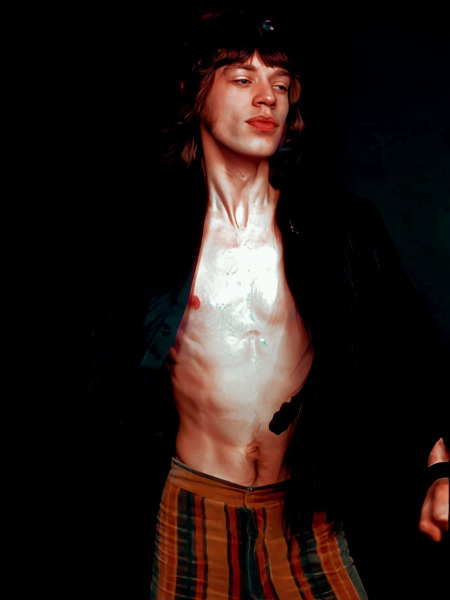


Mick Jagger, Ryan Reynolds, and Bob Marley all have their tenth lords in Mars ruled nakshatras. Mick's is in Mrigashira, Ryan's is in Chitra, and Marley's is in Dhanistha.
… HAVE A PUBLIC PERSONA MOST SHAPED AND DEFINED BY YOUR IMPULSES, INDIVIDUALITY, AND INDEPENDENCE.
Those born with this placement usually find themselves at odds with the rest of society. Though they don't necessarily fail to fit in with the culture of their time, they tend to let their gut instincts dictate the way they engage with it and this results in distinct and memorable individuals who stand out from the crowd, and cause waves with just their personalities and the effect they have on others. Thus, they may be capable of contributing to massive culture shifts. However, they're also liable to let their impulses lead them to scandal and enmity.
Mars is a chthonic planet, and so it's no surprise we see it ruling the lord of the house of status and legacy in many of the most famous and widely mourned celebrities but that doesn't make this a death sentence for the influential. More than anything, fame in tangent with this placement signifies someone who inspires controversy, not with their choices or behaviors, but in their possessing fame at all. Other people will argue over the legitimacy of whatever talent, beauty, act, or positive attribute to which their fame is attributed. Their fame may be cyclical, as may be the public's support or enmity towards them.
MORE ON THE SPECIFICS OF MRIGASHIRA, CHITRA, AND DHANISTHA BELOW!
IF MRIGASHIRA RULES THE TENTH LORD, YOU…
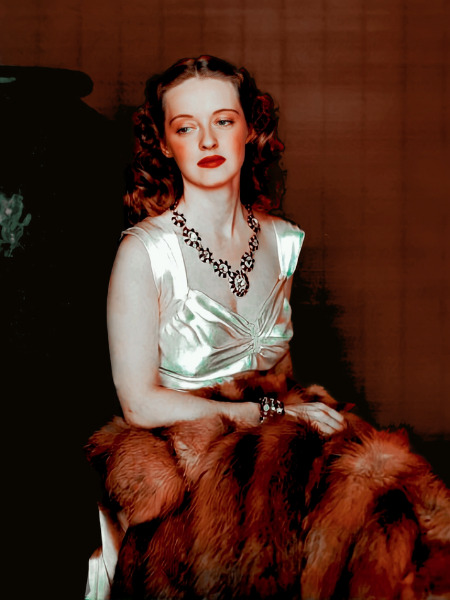

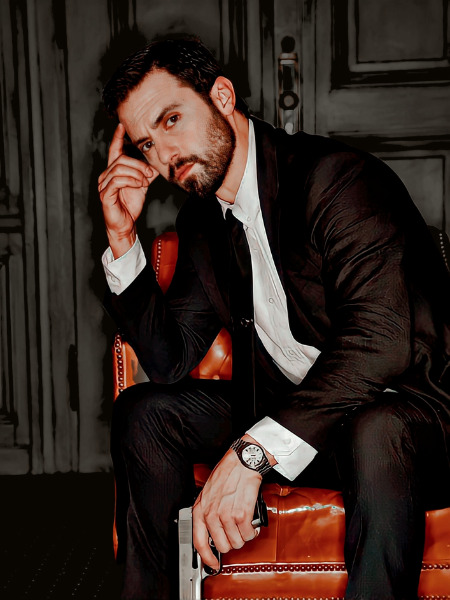
Bette Davis, Lord Byron, and Milo Ventimiglia all have their tenth lords in Mrigashira. Others with this placement are Louis Lumiere, Prince Philip, Claudia Schiffer, Babe Ruth, Christopher Lee, and George Lucas.
Find yourself constantly searching within your professional and public spaces for something more fulfilling than what you have.
Throw yourself into your work, and are eager to learn whatever you can to develop and improve your craft, or your social standing.
Communicate articulately about responsibilities and projects, as well as political beliefs and social causes that are important to you.
Network and establish your personality easily, as your work and your society inspire you to engage in debate consistently.
Have an eye for major trends and business opportunities, and can capitalize on them just as they take off, leading the charge.
AND YOU MAY FIND…
Pursuit, stalking, or cheating might be a pattern at your workplace.
Quickness is the key trait that defines your reputation: in casting judgement, responding to a crisis, and haste to get desired results.
Your work has you spending time in recreation-friendly spaces: parks, street markets, town squares, playgrounds, your home, etc.
Sensitivity to your surroundings makes you adept at resolving immediate problems involving authorities or a formal setting.
Over-sensitivity, whether to sensory experiences, to tone, or to social graces, can lead to overreactions that confuse people.
MRIGASHIRA is the Searching Star. Industries and career types favored are those involving art, expression, navigation, earth, textiles, animals, trends, sales, advertising, agriculture, telecommunications, occult studies, crafts, research, drama, and travel.
IF CHITRA RULES THE TENTH LORD, YOU…

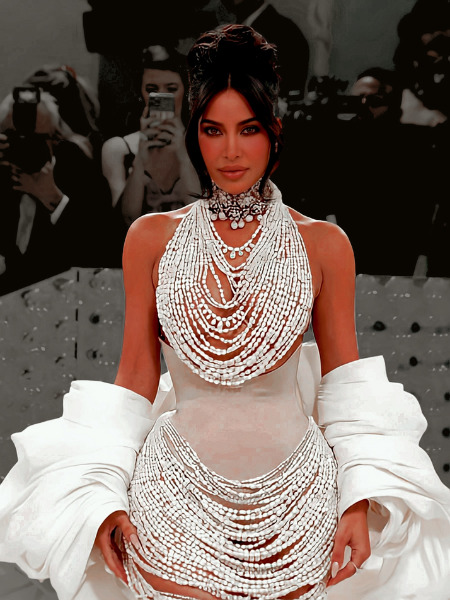
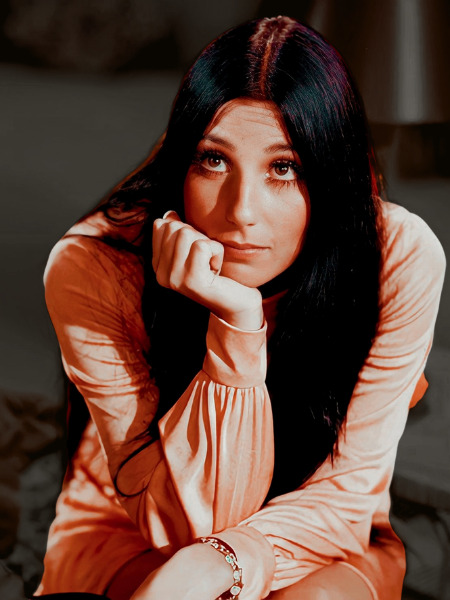
Mary Tyler Moore, Kim Kardashian, and Cher all have their tenth lords in Chitra. Others with this placement are Leonard Cohen, Mika, Diego Rivera, Bette Midler, Cesare Borgia, John Mayer, Leonardo Dicaprio, Paul Williams, Emily Dickinson, and Queen Elizabeth I.
Find it easy to engage with coworkers and members of the public as equals, both to yourself and to one another.
Experience the most professional and political epiphanies when everyone else is asleep, especially at three to four in the morning.
Strategize and organize your workspace as well as career and public events with ease and poise, to the satisfaction of all.
Can be stingy and thrifty with professional funding, and turn a critical eye upon those who insist on lax public spending, even if as an individual you practice generosity and charity.
May experience jealousy, or just suspicion, toward coworkers, public figures, or others in your field who remind you of yourself.
AND YOU MAY FIND…
Legacies play a role in the way that your workplace or public persona operates, such as becoming or gaining an apprentice, but you may find it hard to get on with those who inherit your position.
Bright colors, flowers, and natural beauty dominate your place of work, or settings with these attributes empower you publicly.
Others treat you with dignity and respect your aesthetic potential, even following your lead with the way you dress for events.
A quick temper and sensitivity to presentation inspires you to challenge the views or choices of others preemptively.
Intense procrastination hinders you in moments of specific importance.
CHITRA is the Star of Opportunity. Industries and career types favored are those involving aesthetics, communication, specialized expertise, design, dynamics, narrative, creative production, quality inspection, force of personality, precision, and reconstruction.
IF DHANISTHA RULES THE TENTH LORD…
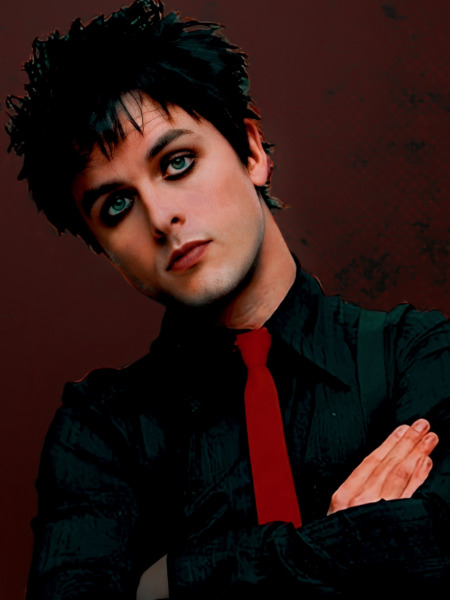
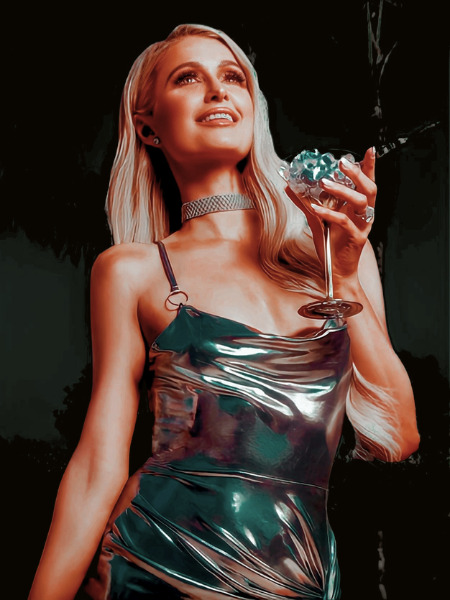
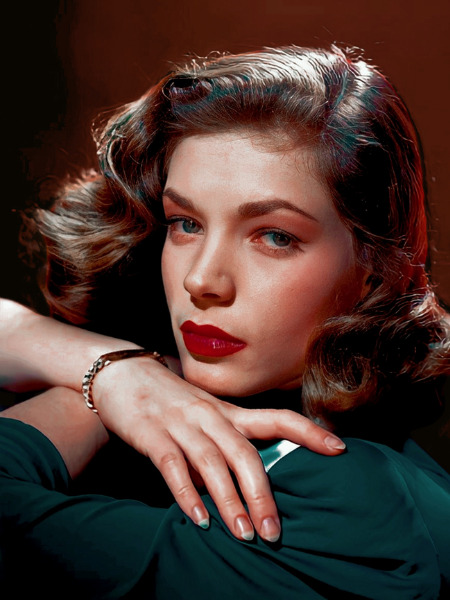
Billie Joe Armstrong, Paris Hilton, and Lauren Bacall all have their tenth lords in Dhanistha. Others with this placement are Carl Sagan, Greta Garbo, Walt Whitman, Antony Armstrong-Jones, King Louis XV, Anna May Wong, Sarah Hyland, Charles Manson, and Liza Goddard.
Are capable of making highly insightful observations about society due to your keen perception and intimate understanding of power.
Had aspirations and politics shaped by a pragmatic altruism from a young age, perhaps in response to a parent or authority figure.
Feel uncomfortable in and experience adversity from business partnerships, and any relationships which are too public-facing.
Attract status and fame, seek positions of dignity, and approach tasks with a sincere desire to produce something of high quality.
Have no qualms about lying to or manipulating others in order to get what you want - and there is a great deal that you want.
AND YOU MAY FIND…
Even accomplishments celebrated in the public sector or by your industry feel hollow to you; the answer may lie in volunteer work.
Gender discrimination affects your workplace, status, or politics.
Popularity among certain demographics and subcultures: namely, the wealthy, the young, the politically liberal, and the creative field.
Any siblings can be of aid to your career and public image, but associating with extended relations may be detrimental to either.
Your experiences with honor or power - that of your own or that of others - affect you on a deep, even spiritual, level.
DHANISTHA is the Star of Symphony. Industries and career types favored are those involving music, timing, rhythm, quality inspection, physical performance, group coordination, property, strategy, math and science, poetry, spirituality, creativity, engineering, and charity.
HOPE THIS WAS HELPFUL. AMOUNT OF REQUESTS MEANS WE’RE GOING OUT OF ORDER, BUT WE WILL ABSOLUTELY RETURN TO THE OTHERS LATER. FEEL FREE TO MESSAGE WITH QUESTIONS, THOUGHTS, OR IDEAS. PART 5 WILL FOCUS ON JUPITER-RULED 10TH LORD NAKSHATRAS NEXT! ♡
#mars#10th house#midheaven#10th lord#vedic astrology#medium coeli#mrigashira#dhanishta#chitra#10th house lord#house lord#astrology#sidereal astrology#mine#natal chart#it's honstly so funny the ratio of male to female 10th house lord celebrities there are#like. on the nose much?#dhanishtha#nakshatra#nakshatras#authored#informal survey
191 notes
·
View notes
Note
"Let me know if you want to know more :))" If it's not asking much, yes, please?! I really know little to nothing about the books. I see what people post here, like, I didn't know about Rose and only found out about Viktor this week lol. Unfortunately the books aren't always available in my country and I'm still waiting to buy and read them. D:
Okay, for a rundown:)))
In the books:
Lestat finds Louis again through the rockstar career, and he writes his own story down for him, which Louis reads. Their reunion is quite beautiful, Louis and Gabrielle fight other vampires side by side with Lestat. There is a kiss backstage :)
Unfortunately Akasha kidnaps Lestat, because she thinks he is the epitome of toxic masculinity and that she can use him for her plan to take over the world (literally), burning a lot of the vampires. It’s a misjudgment though, Lestat is fearful of her killing the ones he loves, but starts to resist her ever more (she forces him to do her bidding via spells at times). Louis, Gabrielle reunite with all the others to hear the history behind Akasha and ultimately they meet up with her and Lestat, ending in Akasha‘s death. Louis and Lestat have a very romantic scene together.
Afterwards Lestat is changed though, battling with the event. He got a huge amount of blood from her, because she wanted him strong, and he experiences severe body dysmorphia and self hatred. Louis and he are in a weird “Netflix and chill“ era, visiting each other regularly, watching movies together, being petty with each other. Lestat’s guilt and that self hatred drive him to suicide, but he is too strong already to burn in the sun and he heals to retain a tan (only). The Body Thief sees his chance and offers him a mortal body for a while, and Lestat takes it. The Body Thief does not return his body though and so Lestat tries to bring Louis to turn him again but Louis refuses (very emotional scene). Louis tells Lestat to live that mortal life and Lestat has to turn to others (David in the book here maybe Daniel?!) to get his body back bc he realizes that he does want to be a vampire (after all). He manages, and there is a very beautiful but very raw scene with Louis in a church afterwards. Lestat tries to convince himself he is evil (for wanting that vampiric life back) and rapes David into darkness just as he was raped into it. All through the book Claudia‘s ghost is there and speaks with him. Lestat has Rue Royale fixed up and he and Louis (and David) live there again.
A while later a being claiming to be the Devil visits Lestat - he wants his help, and takes his soul onto a journey beyond (it is later confirmed that Lestat was gone from this plane of existence) and the events with heaven, hell, purgatory and Lestat drinking the blood of Christ (literally) shatter him. He loses an eye in purgatory, which is returned to him, altered. He goes a bit mad, confined to a church, where Louis and a few others tend to him. Louis comes by regularly to read to him, change clothes, etc. Lestat falls into a sleep.
Lestat’s coma continues, but it is involuntary at times. As he later tells it the altered eye allowed angels to take his soul to do their bidding, while threatening him. The unpublished novel at Tulane tells of one of those adventures. Lestat’s coma is hard on Louis. He is haunted by the fact that he has never seen Claudia’s ghost and with the help of Merrick, a witch, they conjure her, an event for which the diary pages are important. Claudia’s ghost is a vengeful one though, hating him, and he tries to commit suicide after. Lestat wakes up and saves him. They reunite and exchange a lot of blood and afterwards Louis is changed a lot. They leave NOLA because the Talamasca threaten them.
Something not closer defined happens while they are in the jungles, and Louis goes to Armand in NYC, where he is safe from the ever multiplying vampires. They spend some time apart, Lestat roaming, Louis with Armand, both coming to terms with who they are now. This is when Rose needing help must have happened. When Viktor was conceived and raised.
Another burning is happening - the spirit that propels them is clming to consciousness: Amel. It uses older vampires to thin out the ranks. Lestat is called and finally returns from his wanderings, and he defeats an elder and takes the core, effectively becoming the prince of the vampires. He and Louis meet, Rose, Viktor and first trouble with Roshamandes happens.
Amel is coming further to consciousness, recalling the being he was, once. Recalling who he was with, too. Lestat sets up court in his old family castle, now renovated. All big players come. Lestat goes to Louis and Louis comes to him - for good, with a very emotional plea. They are together for good after. Amel need to be removed fromthe vampires and Lestat, he gets a cloned body. Louis comes up with the solution, and holds Lestat’s hand through it.
Roshamandes, the ancient slighted bc he did not get the core is outfor revenge tjough, and kidnaps Gabrielle, Louis and Marius, sending ashes to Lestat. Lestat… shuts down. Armand goes feral (in words, incredible scene!!).
Lestat goes to Roshamandes in an all-or-nothing move and kills him, creating the “Blood Communion“ with the remains. Louis and the others are found, and Lestat can finally breathe again There is a big celebration, and the book literally closes with them dancing and kissing and Lestat telling Louis he loves him and always had.
______
This is the rundown :)
As you can imagine there is a LOT the show can do with this. In the books they kiss, the show has added sex, and so I expect some scenes to be a lot more sexy :) Louis is a lot more involved in the later arcs, his and Lestat‘s arcs are inverted. When they finally come together (for good) once more they are at peace with each other.
They have a son, and a daughter, their friends are with them. Former loves, too.
They have left their human pains behind, have accepted themselves as vampires.
Louis calls it the “monarchy of darkness“ in the unpublished draft at Tulane, and knowing Rolin knows of those drafts… I do expect this on the show :)
Obviously some of this will be spun differently. Has already been used, and/or used differently. But I expect to see the Body Thief parts, definitely. Akasha and the aftermath. And we know we’re getting the rockstar era :))
I think the show has already hinted at Amel, and so I do think they’ll finish with that arc :)))
We‘ll see. Since the relationship in the show is deliberately more explicit I think a lot of the canon events will be a LOT more intimate. It’s not about sex for them.
It’s about eternity and acceptance, both self acceptance and acceptance of the other.
And I cannot wait to see what the show makes of it.
#anonymous#ask nalyra#interview with the vampire#iwtv#amc iwtv#amc interview with the vampire#lestat de lioncourt#louis de pointe du lac#loustat#vc#the vampire chronicles
86 notes
·
View notes